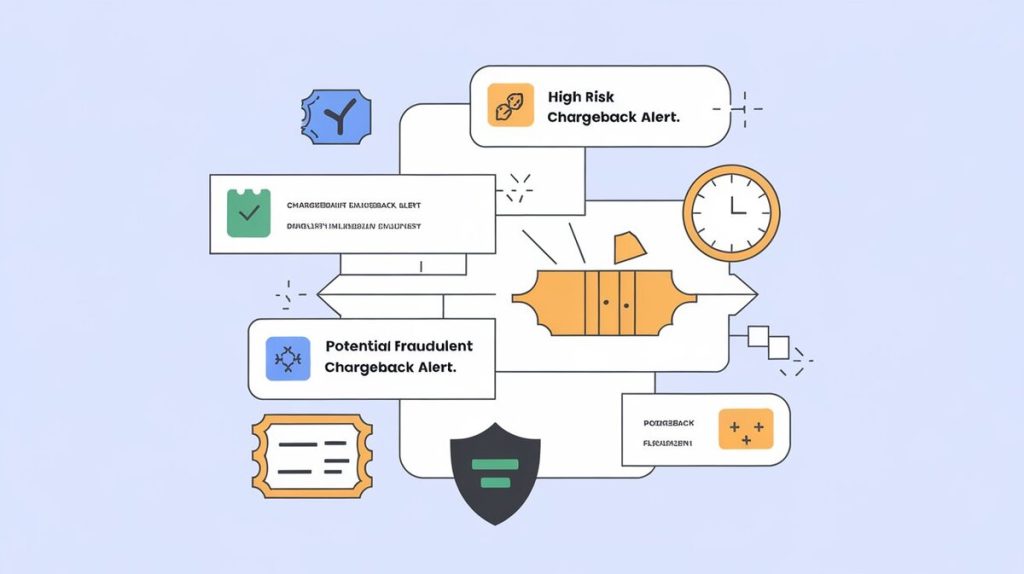Handling chargebacks has become a necessity for modern businesses. Chargebacks occur when a customer disputes a transaction, and the financial fallout often hits merchants hard. Chargeback alerts help merchants preemptively tackle disputes before they turn into full-blown chargebacks, saving time, money, and maintaining their account health.
What Are Chargeback Alerts?
Chargeback alerts notify merchants when a customer initiates a dispute. These alerts provide merchants with a brief window, usually 24 to 72 hours, to resolve the issue before it escalates into a chargeback. Merchants can choose to issue a refund or gather evidence to challenge the dispute.
Chargeback alerts are especially critical for maintaining a healthy chargeback ratio. Merchants with chargeback ratios above 1% face penalties, including higher fees, account restrictions, and possible blacklisting. Proactively addressing disputes can help avoid these consequences.
How Chargeback Alerts Work
Chargeback alerts notify merchants through their payment gateways or other networks connected to VISA, MasterCard, and similar systems. These alerts allow merchants to act before disputes become chargebacks. Immediate action, such as issuing refunds or presenting evidence, often prevents further escalation.
According to MasterCard, using chargeback alerts can reduce chargebacks by 20-30%. Payment processors like Checkout.com note that merchants using alerts save an average of 25-30% on dispute-related costs.
Benefits of Chargeback Alerts for Merchants
Implementing chargeback alerts offers several benefits:
- Reduced Chargeback Ratios: Alerts allow merchants to resolve disputes before they become chargebacks, reducing chargeback ratios by up to 40%.
- Cost Savings: While each chargeback costs around $128, alerts typically cost $35 to $50 each, making them a cost-effective solution.
- Increased Customer Retention: Addressing disputes promptly can improve customer satisfaction, potentially retaining customers who might have left due to unresolved issues.

Cost of Chargeback Alerts
The cost of using chargeback alerts generally ranges from $35 to $50 per alert, depending on volume and provider. Merchants must weigh this cost against the potential savings from preventing chargebacks and the penalties that come with a high chargeback ratio.
Here’s a cost comparison showing the potential savings for merchants:
| Scenario | Cost Without Alerts | Cost With Alerts | Savings |
|---|---|---|---|
| 10 Chargebacks Per Month | $1,280 ($128 each) | $500 ($50 per alert) | $780 |
| 50 Chargebacks Per Month | $6,400 | $2,500 | $3,900 |
| 100 Chargebacks Per Month | $12,800 | $5,000 | $7,800 |
Chargeback Alerts Providers
Chargeback alert services are provided through VISA, MasterCard, and integrated solutions from payment processors like Braintree and Stripe. These services help merchants manage and respond to disputes, preventing them from turning into chargebacks.
- VISA’s Chargeback Prevention Tools: VISA provides real-time chargeback alerts that help merchants handle disputes quickly. By using VISA’s tools, merchants can reduce chargebacks by up to 30%.
- MasterCard Dispute Resolution Services: MasterCard’s tools help merchants resolve disputes across global markets, reducing the risk of chargebacks.
A recommended provider in the chargeback prevention space is Merchanto.org, an official partner of both VISA and MasterCard. Merchanto.org integrates chargeback prevention solutions directly into merchant payment systems, streamlining the process of handling disputes. For more details, visit Merchanto.org.
Challenges of Managing Chargeback Alerts
While chargeback alerts are effective, they come with challenges:
- Response Time: Merchants must respond to alerts within 24-72 hours. Failure to act in time results in the dispute escalating into a chargeback.
- Duplicate Alerts: Some merchants receive duplicate alerts when using multiple providers. According to Braintree, this can lead to increased costs. Merchants should ensure they use providers that consolidate alerts to avoid redundant charges.
- Dedicated Resources: Handling chargeback alerts requires resources. Merchants need either dedicated staff or automated systems to respond to alerts promptly.
Despite these challenges, the savings on chargeback fees and penalties make it worth the investment.
Consequences of High Chargeback Ratios
Exceeding a chargeback ratio of 1% can lead to serious consequences. Merchants with high chargeback ratios may be placed in chargeback reduction programs, which involve additional fees and increased scrutiny.
| Chargeback Ratio | Consequences | Additional Fees |
|---|---|---|
| 1.0% or Below | Standard processing rates | None |
| 1.01% to 1.5% | Placed on chargeback program | $50 per chargeback |
| 1.51% and Above | Higher fees, potential account termination | Up to $100 per chargeback |
| 2.0% and Above | Immediate risk of blacklisting | Loss of merchant account |
Maintaining a chargeback ratio below 1% is critical for merchants, especially those in high-risk industries.

Key Strategies for Maximizing Chargeback Alert Efficiency
Merchants using chargeback alerts can maximize their effectiveness with these strategies:
- Integrated Systems: Ensure that your payment processor integrates with your alert system to streamline responses. This reduces the time it takes to address disputes.
- Real-Time Monitoring: Merchants should allocate resources to monitor alerts and act within the critical 24-72 hour window. Automation tools offered by providers like Checkout.com can simplify this process.
- Data Analysis: Use analytics to understand common dispute patterns. This can help adjust fraud prevention strategies and reduce future chargebacks.
Table: Penalties for Chargebacks
| Chargeback Ratio | Consequences | Penalties |
|---|---|---|
| 1.0% | Normal processing fees | None |
| 1.01% to 1.5% | Extra fees and chargeback monitoring | $50 per chargeback |
| Above 1.5% | Risk of account termination | Up to $100 per chargeback |
| Above 2.0% | Blacklisting as high-risk merchant | Loss of processing account |
If a merchant’s chargeback ratio exceeds 1.5%, penalties can accumulate rapidly, making proactive management through alerts essential.
Conclusion: Chargeback Alerts Are Essential
Chargeback alerts are critical for merchants to maintain operational efficiency and avoid the financial consequences of chargebacks. By preventing disputes from escalating, merchants can save on fees, protect their accounts, and improve customer satisfaction. For merchants dealing with high volumes or operating in risky sectors, chargeback alerts should be a priority.
Chargeback alerts offer an effective, cost-saving strategy to mitigate risks, reduce chargeback ratios, and maintain a healthy financial standing. Every merchant, whether handling small or large volumes of transactions, should consider integrating chargeback alerts into their business strategy.



